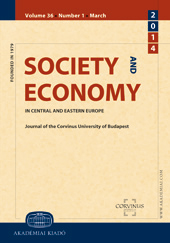Measuring the efficiency of EU funds — The ‘Youth’ programme in Germany as an example
Measuring the efficiency of EU funds — The ‘Youth’ programme in Germany as an example
Author(s): Horst Hanusch, Andreas Riedl, Florian WackermannSubject(s): Economic policy, EU-Approach / EU-Accession / EU-Development
Published by: Akadémiai Kiadó
Keywords: measuring efficiency; measuring effectiveness; cost-effectiveness analysis; European Union ‘YOUTH’ programme;
Summary/Abstract: Since it is crucial for public institutions to spend the taxpayers’ money effectively and efficiently, we have analysed the methods used to check for these two criteria in the European Union’s ‘YOUTH’ Programme. We find that the currently applied method is not theoretically sound and also hardly justifiable politically. Therefore, we present a new approach which includes the important aspects that a public organisation needs to respect: it is theoretically correct and fulfils economic standards; it is valid in political standards; it is feasible; and it is easily understandable for a large public. We singled out two factors which are readily observable and are good proxies for the decision if a project is worth supporting by public funds: the number of people reached and the quality of the programme proposed. We also show why our method is better suited to measuring the effectiveness and the efficiency of spending public funds, and judge the new approach in the modified framework for 2007–2013.
Journal: Society and Economy. In Central and Eastern Europe ǀ Journal of the Corvinus University of Budapest
- Issue Year: 30/2008
- Issue No: 2
- Page Range: 323-338
- Page Count: 16
- Language: English

